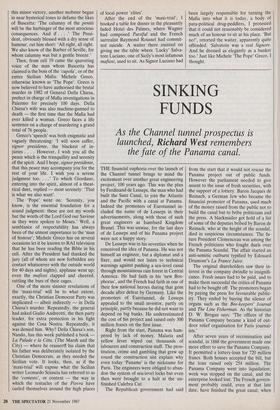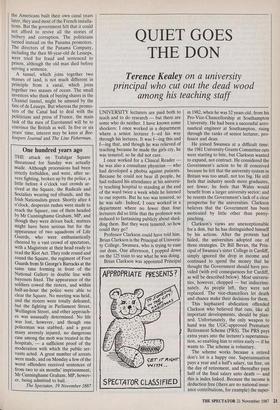SINKING FUNDS
As the Channel tunnel prospectus is the fate of the Panama canal.
THE financial euphoria over the launch of the Channel tunnel brings to mind the excitement over another great engineering project, 100 years ago. This was the plan by Ferdinand de Lesseps, the man who had built the Suez Canal, to join the Atlantic and the Pacific with a canal at Panama. Indeed the promoters of Eurotunnel in- cluded the name of de Lesseps in their advertisements, along with those of such great engineers as Isambard Kingdom Brunel. This was unwise, for the last days of de Lesseps and of his Panama project were not a happy story.
De Lesseps was in his seventies when he conceived the idea of Panama. He was not himself an engineer, but a diplomat and a fixer, and would not listen to technical warnings against pushing a sea-level canal through mountainous rain forest in Central America. He had faith in his 'new Bos- phorus', and the French had faith in one of their few national heroes during that grim decade after defeat by Germany. Like the promoters of Eurotunnel, de Lesseps appealed to the small investor, partly on principle, partly because he did not want to depend on big banks. He underestimated the cost of his project and raised only 300 million francs on the first issue.
Right from the start, Panama was ham- pered by lack of money. Malaria and yellow fever wiped out thousands of labourers and construction staff. The pros- titution, crime and gambling that grew up round the construction site explain why even today Taname' is the nickname for Paris. The engineers were obliged to aban- don the system of sea-level locks but even then were brought to a halt at the un- finished Culebra Cut.
The Republican government had said from the start that it would not rescue the Panama project out of public funds. However the parliament needed to give assent to the issue of fresh securities, with the support of a lottery. Baron Jacques de Reinach, a German Jew who became the financial promoter of Panama, used much of the money raised from the public not to build the canal but to bribe politicians and the press. A blackmailer got hold of a list of some of the deputies bribed by Baron de Reinach, who at the height of the scandal, died in suspicious circumstances. The fu- ture President Clemenceau was among the French politicians who fought duels over the Panama Scandal. The affair started an anti-semitic outburst typified by Edouard Drumont's La France Juive.
The original shareholders saw their in- terest in the company dwindle to insignifi- cance. Fresh issues had to be paid, and to make them successful the critics of Panama had to be bought off. The promoters began by paying the press for favourable public- ity. They ended by buying the silence of organs such as the Bee-keepers' Journal and The Line Fisherman. As the historian D. W. Brogan says: 'The offices of the Panama Company became a kind of out- door relief organisation for Paris journal- ists.'
After seven years of recrimination and scandal, in 1888 the government made one more effort to save the Panama Company. It permitted a lottery-loan for 720 million francs. Both houses accepted the bill, but the loan raised only 254 million. The Panama Company went into liquidation; work was stopped on the canal, and the enterprise looked lost. The French govern- ment probably could, even at that late date, have finished the great canal; when the Americans built their own canal years later, they used most of the French installa- tions. But the government felt that it could not afford to revive all the stories of bribery and corruption. The politicians turned instead on the Panama promoters. The directors of the Panama Company, including the then 88-year-old de Lesseps, were tried for fraud and sentenced to prison, although the old man died before serving a sentence.
A tunnel, which joins together two masses of land, is not much different in principle from a canal, which joins together two masses of ocean. The small investors who think of buying shares in the Channel tunnel, might be amused by the fate of de Lesseps. But whereas the promo- ters of the Canal had to deal with the politicians and press of France, the main task of the men of Eurotunnel will be to convince the British as well. In five or six years' time, interest may be keen at Bee- keepers Journal and The Line Fisherman.



































































 Previous page
Previous page